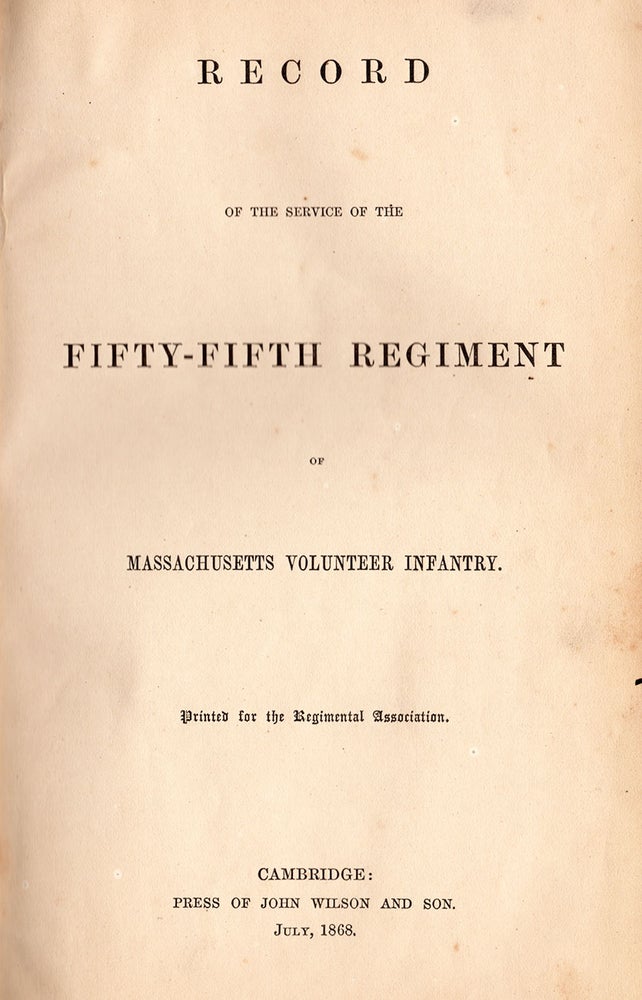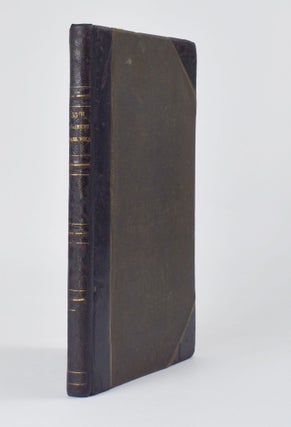Record of the Service of the Fifty-Fifth Regiment of Massachusetts Volunteer Infantry. Printed for the Regimental Association.
Cambridge, Mass.: Press of John Wilson and Son, 1868. 8vo (9.25” x 5.75”), three-quarter black leather with brown cloth. [iv], 144 pp. CONDITION: Good, re-backed with original spine laid down (with some loss to original spine), light dampstaining to covers, dings to covers and spine-title; two tape-repairs to preface and verso title-page, lightly foxed throughout. Col. Charles B. Fox’s scarce account of his service with the 55th Mass. Infantry Regiment—the second African American regiment formed during the Civil War—with important content on the company’s black volunteers. Massachusetts Governor John Andrew created the 55th in 1863 in response to the demand for enlistment in the already full 54th (the first officially recognized black military unit in the U.S.). Like the 54th, the 55th was commanded by white officers, many from abolitionist families. Fox’s account of his service with the 55th primarily follows his diary, dating from 1863 to 1865. Produced by the Association of Officers of the 55th Mass. Volunteers, the volume is rounded out with letters from Governor John Andrew; sketches of deceased officers; the roll of surviving officers; statistics of enlisted men, and a roster of enlisted men. The soldiers of the 55th were recruited from the various northern states by both white and black abolitionists alike, including William Lloyd Garrison and Frederick Douglass. After training at Camp Meigs near Readville, Mass., the 55th saw the bulk of its action in South Carolina. “They served under General Truman Seymour in the 1864 invasion of Florida where they took part in the Battle of Olustee on February 20. The 55th also saw action in battles once they returned to South Carolina. First, they fought on James Island in May and later in July of 1864 and also the Battle of Honey Hill in November of the same year. As the Union Army made headway on the Confederate forces throughout South Carolina early in 1865, troops began to close in on Charleston…When the Union troops finally reached Charleston on February 21, they met crowds of liberated slaves and free blacks who rejoiced at their arrival. Although the 55th Massachusetts Infantry was not the first black Union unit to enter Charleston, symbolically important as the birthplace of the Civil War, they did arrive to the shouts and cheers of newly freed women, men, and children. The 55th Massachusetts Infantry Regiment remained in South Carolina for the remainder of their service where they fought other battles at Briggen Creek on February 25 and Saint Stephens on March 1. The 55th also occupied Charleston through much of the summer of 1865 before finally returning to Massachusetts where they were marshaled out of service in Boston in September of 1865” (Yared, Black Past). Born in Newburyport, Mass., Charles Barnard Fox (1833–1895) was reared in the Unitarian faith, and in his youth was exposed to the fierce abolitionist Rev. Nathaniel Hall. Fox worked as a civil engineer before his commission as lieutenant in Co. K of the Massachusetts 13th Infantry Regiment from 1861 to 1863. In May 1863 he was promoted to Major and served with the Mass. 55th Infantry Regiment, receiving a promotion to lieutenant colonel in Nov. 1863. Fox led the 55th during multiple campaigns, and his bravery and courage were commended when he was made brevet colonel. After being mustered out in June 1865, he managed a cotton plantation on Sea Island off the coast of South Carolina before working again as a civil engineer. After the war he also formed a real estate partnership, Holbrook & Fox and served in the Massachusetts legislature. Fox’s obituary reads in part: “It was abundantly shown in his long and meritorious service in the army during the civil war, and especially in his readiness to enter a branch of the service that was not regarded with favor even by many who in theory favored perfect equality between races, and which was not calculated to attract the young soldier powerfully, in comparison with the more popular and agreeable positions in white regiments. But Colonel Fox believed in the equality of the black men with the white, and whatever he believed he lived up to, and the relations which existed between him and the colored soldiers in his command were ever the most intimate and mutually regardful nature” (from obit. via Sammarco). REFERENCES: Dornbusch, Charles E. Military Bibliography, Massachusetts, no. 405; Fox Family Papers at masshist.org; Sammarco, Anthony M. Colonel Charles B. Fox at anthonysammarcoshistory.blogspot.com; Yared, Ephrem. 55th Massachusetts Infantry Regiment (1863–1865) at blackpast.com.
Item #6938
Sold



